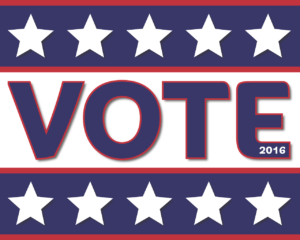Disabled and fighting for the right to vote
by Beth
 During every election cycle I am astonished to hear about the percentage of average able-bodied Americans who “don’t bother” to vote. If the story I heard today on NPR’s Morning Edition program doesn’t inspire them to get to their polling places in November, I don’t know what will.
During every election cycle I am astonished to hear about the percentage of average able-bodied Americans who “don’t bother” to vote. If the story I heard today on NPR’s Morning Edition program doesn’t inspire them to get to their polling places in November, I don’t know what will.
The story was about David Rector, a former producer for NPR who lost his ability to walk or speak after a brain injury. David’s fiancée was appointed his legal guardian afterwards, and the appointment of a legal guardian meant that Rector lost his right to vote.
Rector recently went to Superior Court in California to file a request to have his voting rights restored, and his fiancée said he was still able to communicate his wishes to a court clerk – he used the electronic voice on his eye-tracking device to say “I, David Rector, want my voting rights restored immediately.”
Under California law, individuals with guardians have to express a desire to vote to be able to do so. David Rector is one of more than 30,000 Californians — and an unknown number of others in the U.S. — who’ve lost their voting rights under state guardianship laws. Those laws vary widely around the country. The NPR report said 11 states do not disqualify individuals from voting because they have a mental disability, but individuals under guardianship in other states are routinely barred from voting. From the NPR story:
“The problem with those laws is that a determination of guardianship or competence really has nothing to do with someone’s ability to vote,” says Jennifer Mathis, director of policy and legal advocacy at the Judge David L. Bazelon Center for Mental Health Law in Washington DC . “They have to do with someone’s ability to ensure their basic health and safety needs.” She says just because someone can’t do one thing, doesn’t mean they can’t do another.
In some states, individuals who have legal guardians must show they have either the ability or desire to cast a ballot before being allowed to do so, which can mean voters with disabilities are held to a higher standard than everyone else. “Those people end up having to answer questions like: Who’s the governor? Who’s the president? Who’s the mayor? Why do you want to vote? How would you vote on a particular issue? And those are exactly the type of questions we never would impose on voters without disabilities,” Mathis said, arguing that this violates the Voting Rights Act.
Rector’s legal guardian said he is very eager to vote this November. He spends much of his time following the news on TV and radio, and his legal guardian says he is better informed than many voters. Now, they just hope they’ve convinced the judge.






